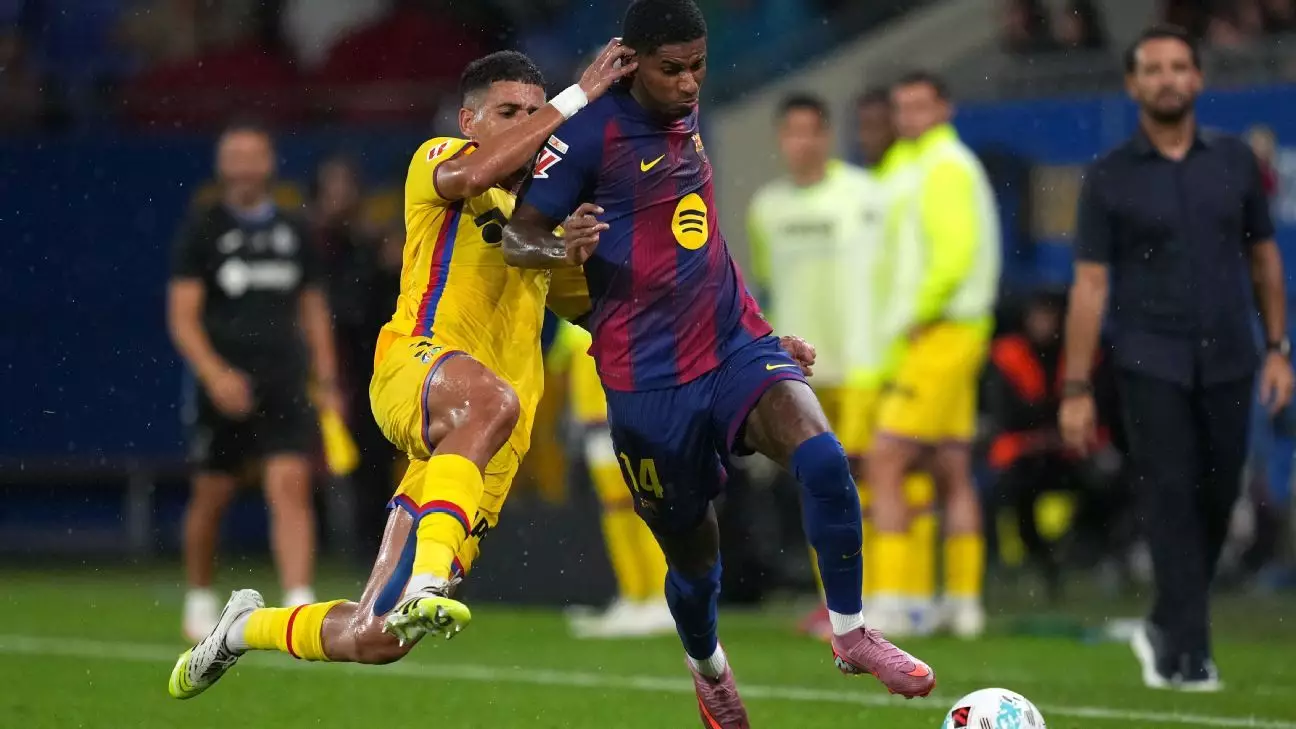In the ruthless world of professional football, discipline isn’t just an abstract virtue—it is the backbone of sustained success. The recent benching of Marcus Rashford by Barcelona’s coach Hansi Flick exemplifies how strict adherence to team protocols can significantly influence player opportunities. While some may see such measures as overly rigid, the reality is that consistency in discipline fosters a climate of professionalism that teams hope will translate into tangible results. Flick’s zero-tolerance policy on lateness, exemplified by Raphinha and other players, underscores an uncompromising stance that aims to cultivate accountability. The marginal lateness Rashford reportedly exhibited becomes a testing ground for this philosophy. Yet, rather than dismiss it as trivial, we should understand it as a reflection of the modern coach’s emphasis on discipline, uniting players under a shared commitment to standards that go beyond individual performance.
Flick’s approach raises a crucial question: to what extent should athletic performance be held hostage to punctuality and minor breaches? The coach’s rationale—that players must remain fresh and ready—resonates with the unforgiving nature of high-level competition. The decision to bench Rashford, despite his exceptional contributions in midweek, emphasizes that consistency in attitude and discipline are deemed as vital as skill and form. This philosophy isn’t about punishment; it is about setting a standard—one that often determines whether a team functions as a cohesive unit or simply a collection of talented individuals.
Strategic Substitutions as a Sign of Trust and Tactical Flexibility
When Rashford finally entered the pitch at halftime, it symbolized more than just a tactical adjustment—it revealed the manager’s nuanced understanding of player management. By bringing on a star player later in the game, Flick was effectively signaling that Rashford remains an integral part of the team’s plans, regardless of the earlier disciplinary issue. His involvement in setting up the final goal demonstrated that even recent benchings must be contextualized within broader tactical considerations.
This approach underscores the importance of trust and patience in the modern game. Coaches today increasingly balance promoting internal discipline with giving star players a chance to influence matches. Such decisions are often seen as a display of leadership confidence, aiming to motivate players rather than alienate them. Rashford’s case exemplifies how managers can navigate the delicate territory of enforcing discipline while maintaining the star power that draws crowds and inspires teammates. The fine line between discipline and trust is a defining characteristic of effective football management—one that ultimately impacts team cohesion and success.
Football as a Microcosm of Broader Societal Tensions
The contrasting comments from Barcelona’s players highlight another layer of complexity: the clash between expectation and perception. Torres’s comment about Barcelona’s high-caliber squad and the aggressive tactics of Getafe reflects the underlying acknowledgment of football’s inequalities. The assertion that “the difference between the teams is €1 billion” hints at the broader societal reality—wealth and resources often translate into on-pitch dominance.
Similarly, the fiery exchange between Torres and Bordalas reveals the underlying tensions that surface during competitive encounters. It’s a stark reminder that football often becomes a mirror of societal structures—where power, money, and privilege shape outcomes. The game’s physicality, as criticized by Torres and defended by Bordalas, echoes broader debates about fairness, respect, and the nature of competition. These tensions aren’t just about sportsmanship; they reflect ongoing discussions about equity and respect within and outside the sports arena.
Moreover, Barcelona’s injury news, including Fermín López’s uncertain prognosis, paints a picture of the precarious nature of success in elite sports. Injuries aren’t merely setbacks—they are variables that can sway momentum in a league where every point matters. The squad’s ability to adapt, recover, and still maintain an unbeaten record underscores the resilience and strategic depth that define modern football clubs.
In the end, the narratives emerging from this week’s encounters reveal that football remains a complex interplay of individual discipline, tactical intelligence, social dynamics, and societal commentary. The decisions behind Rashford’s benching exemplify a drive for discipline that may seem harsh but aims to uphold standards essential for team success. Barcelona’s triumph, despite injury setbacks and internal debates, underscores that resilience and strategic management are the true currencies of victory. This sport, like life itself, demands balancing relentless standards with trust, adaptability, and an awareness of the wider social fabric it reflects—an ongoing challenge that defines football’s enduring appeal.

